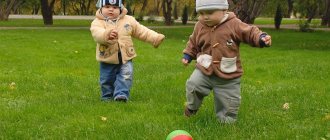Forming a child’s personality is the first step in preparing him for adulthood. This is an important task for parents and society, and it is not limited to just teaching certain skills. To raise a mature personality, it is necessary not only to tell him about discipline, self-care and the like, but also to instill moral and ethical standards and spiritual values.
What is personality formation
Personality formation is a complex process that is not interrupted at any stage of human life. Simply put, it is infinite. The very concept of “personality” is very multifaceted, and there are two popular professional views on this phenomenon. One of them says that the formation of a child’s personality depends on natural innate data. The second opinion indicates that personality is a social phenomenon, and only society influences its formation.
In fact, the entire period of a person’s life, from birth to adulthood, is a process of personal growth or degradation. It is believed that development occurs in activities that are significant to the individual. The driving force can be called internal contradictions between the needs of a growing child and the real possibility of their implementation. The child’s activities are almost always determined by the parents and, to one degree or another, directed by them. Conclusion: the process of upbringing is the leading factor in the formation of a child’s personality.
Phases of personality development
There are three phases in the formation of a child’s personality
Adaptation
Lasts from birth until adolescence. The individual assimilates social experience - he adapts, imitates, adapts. During adaptation, there is an active adoption of social norms and mastery of various forms of activity. Having shown his own individuality in the group, the child cannot express himself as an individual until he masters the norms existing in the group.
He feels the need to be like others, adapting as much as possible in society. We can talk about a kindergarten or school.
Group activities can provoke the emergence of favorable conditions for the formation of the child’s personality and those traits that were not previously inherent in the individual, but which are characteristic of other members of the group.
Personalization
The child has a desire to oppose himself to others, to stand out. A critical attitude towards the norms of society and established social rules is formed. The impetus for individualization is the contradiction between the result of adaptation and the need for personalization that was not satisfied at the initial stage. The search begins for methods that help in gaining individuality and fixing it. This can manifest itself in behavior, clothing, speech, and so on. If, during the formation of a child’s personality, he has successfully coped with adaptation, then gradually he begins to understand that individuality is being lost. The individual mobilizes internal resources and begins to search for a society capable of providing the necessary personalization.
Integration
The child has a desire to find his place in society, to fit into society. Integration is easy if society accepts the person. Other results are also possible. A person tries in every possible way to preserve his difference, which leads to aggressive interaction with society and people. Integration is characterized by contradictions between the subject’s desire to demonstrate his own individuality and the community’s desire to cultivate and approve only those individual qualities of the subject that correspond to its preferences.
Personality and personal development of preschool children
Personality is a complex and multifaceted phenomenon that includes many components. In psychological science there are several generally accepted provisions regarding personality. At the very least, we can talk about four main points:
- Personality is inherent in every person.
- Personality is what distinguishes a person from animals, which do not have a personality.
- Personality is a product of historical development, that is, it arises at a certain stage in the evolution of the human being.
- Personality is an individual, distinctive characteristic of a person, that is, what distinguishes one person from another.
The basis of personality characteristics is self-esteem, which includes attitude towards oneself and knowledge about oneself.
Personality qualities are formed throughout life and depend on the social environment.
By the end of preschool age, self-awareness is formed due to intensive intellectual and personal development; it is usually considered a central new formation. The child begins to talk about himself “I”, recognize himself in the mirror and in photographs at 2.3-3 years. Gradually he begins to realize himself as the cause of the events happening around him and with him. Begins to recognize himself as the subject of his own actions and actions. Understand your needs and desires. He strives to express himself through his own actions (“I myself!”). The crisis of three years is connected with this.
At four years old, a child begins to be interested not just in any phenomenon in itself, but in the causes and consequences of its occurrence. So the main question becomes “why?” The child develops and becomes more physically resilient. This stimulates the development of psychological endurance. Fatigue decreases, the mood background levels out, becomes more stable, and less susceptible to changes. At this age, a peer becomes more significant and interesting. Gender preferences begin to emerge. A big step forward is the development of the ability to form inferences, which is evidence of a separation of thinking from the immediate situation. The dependence of attention on emotional saturation and interest in them remains. But stability and the possibility of arbitrary switching develop. Sensitivity to physical discomfort decreases. Fantasy continues to develop actively. At the age of 4-5 years, the shortcomings of raising a child begin to gradually take root and turn into stable negative personality traits.
In a 5-6 year old child, an adult’s assessments are subject to critical analysis and comparison with their own. Under the influence of these assessments, the child’s idea of the real self and the ideal self are differentiated more clearly. The child strives to share his knowledge and impressions with peers, which contributes to the emergence of cognitive motivation in communication. The development of volition and volitional qualities allows the child to purposefully overcome certain difficulties specific to a preschooler. The subordination of motives also develops. Interest in arithmetic and reading appears. Based on the ability to imagine something, a child can solve simple geometric problems. In addition to the communicative function, the planning function of speech develops, that is, the child learns to consistently and logically organize his actions and talk about it. Self-instruction develops, which helps the child organize his attention in advance on the upcoming activity.
Against the background of emotional dependence on the assessments of an adult, the child develops a desire for recognition, expressed in the desire to receive approval and praise, to confirm his importance. It is necessary to form the habit of moral behavior in a child.
The self-esteem of a child of senior preschool age, 6-7 years old, is sufficient and adequate; it is more likely to be overestimated than underestimated. The child evaluates the result of activity more objectively than behavior.
Visual and figurative thinking with elements of the abstract develops.
Features of the development of self-awareness in preschool age:
- a critical attitude arises towards the assessment of adults and peers;
- peer assessment helps the child evaluate himself;
- the preschooler is aware of his physical capabilities, skills, moral qualities, experiences and some mental processes;
- by the end of preschool age, correct differentiated self-esteem and self-criticism develop;
- the ability to motivate self-esteem develops;
- awareness of oneself in time, personal consciousness appears.
Self-esteem appears in the second half of the period on the basis of an initial purely emotional self-esteem (“I am good”) and a rational assessment of other people’s behavior. The child first acquires the ability to evaluate the actions of other children, and then his own actions, moral qualities and skills.
Gradually, step by step, the child’s personality is formed, and each new shift in the formation of the personality changes the influence of conditions and increases the possibilities for further education. The conditions for personal development are so closely intertwined with development itself that it is almost impossible to separate them. The development of a child's personality includes two sides. One of them is that the child gradually begins to understand the world around him and realizes his place in it; this gives rise to new types of behavioral motives, under the influence of which the child performs certain actions. The other side is the development of feeling and will. They ensure the effectiveness of these motives, the stability of behavior, and its certain independence from changes in external circumstances.
The human “I”, the internal content of the personality, does not arise and is formed from itself, but only in the process of communication with surrounding people, in which certain personal relationships develop. And the nature of the child’s relationships with others largely determines what kind of personal qualities will be formed in him.
Two types of patterns of age-related personality development can be distinguished:
- Psychological patterns of personality development, the source of which is the contradiction between the individual’s need for personalization (the need to be a person) and the objective interest of his reference communities to accept only those manifestations of individuality that correspond to the tasks, norms, values and conditions of development of these communities.
- Patterns of personality development both as a result of entering new groups for him, which become referent for the individual, acting as institutions of his socialization (family, kindergarten, school, work collective, etc.), and as a result of changes in his social position within relatively stable group.
As noted above, the formation and development of personality is influenced by the social environment. We include his parents, teachers (educators), and peers in the social environment of a preschooler.
The main way adults influence the development of children’s personality is through organizing children’s assimilation of moral norms that regulate people’s behavior in society. These norms are acquired by the child under the influence of models and rules of behavior. Models of behavior for children are, first of all, adults themselves - their actions, relationships. The most significant impact on a child is exerted by the behavior of those closest to him. He is inclined to imitate them, adopt their manners, borrow from them their assessment of people, events, and things. However, the matter is not limited to loved ones. A preschool child gets acquainted with the life of adults in many ways - by observing their work, listening to stories, poems, and fairy tales. The model for him is the behavior of those people who evoke the love, respect and approval of others. The behavior of peers who are approved and popular in the children's group can also serve as a model for a child. Finally, the patterns of behavior presented in the action of a fairy-tale character, endowed with certain moral traits, are of no small importance. The decisive moment in the assimilation of patterns of behavior that go beyond the behavior of the people around the child is the assessment given to other adults, children, characters in stories and fairy tales by people to whom the child is attached, whose opinion is most authoritative for him. By presenting demands to children and evaluating their actions, adults thus ensure that children comply with the rules. Gradually, children themselves begin to evaluate their actions based on ideas about what behavior others expect from them.
In childhood, the educational influence of parents and loved ones is one of the decisive factors in the formation of a certain stereotype of behavioral reactions and characterological characteristics. Scientists have identified some types of improper upbringing that can affect a child’s behavior.
Neglect.
For some reason, the child finds himself completely out of sight of his parents. The latter only outwardly supposedly take care of him (feeding, clothing), but basically the child is left to his own devices. They are not interested in his spiritual needs and hobbies; his actions and behavior remain uncontrolled. Formally carried out education should also be classified as this type. Parents show interest in the child only as a matter of form.
Overprotection.
Excessive guardianship with continuous prohibitions, instructions, moralizing, control over every step of the child has an extremely adverse effect on the formation of his strong-willed and characterological qualities. It deprives him of initiative and independence, suppresses his sense of responsibility and duty.
“Idol of the family” or “ mimosa
education.”
Unlike overprotection, there is a desire to protect the child from the slightest difficulties and all sorts of unpleasant responsibilities. An atmosphere of admiration, exaggeration and praise of his abilities and talents, often imaginary, is created around the child. All the child’s wishes are unconditionally fulfilled, he is the center of attention of the family. Such hyper-attention contributes to the formation of egocentrism and interferes with the development of systematic work skills and independence in solving assigned tasks.
Emotional rejection, Cinderella-type education.
This type of upbringing is typical for families where the mother or father is burdened by a child who constantly feels this, especially if there is another child in the family who receives more attention, warmth and care from the parents. Emotional rejection contributes to the development of increased vulnerability and sensitivity, resentment and secrecy.
Abusive relationships.
Cruel treatment with harsh reprisals for minor offenses and disobedience causes fear of parents and bitterness in the child.
Parents strive to give their child the broadest education possible, to develop his real and, more often than not, imaginary abilities. In addition to kindergarten, the child is involved in music, a foreign language, sports, and studies in a preschool gymnasium. He is constantly busy, in a hurry to get somewhere, and is constantly required to know. He simply cannot master the planned program due to his age and intellectual capabilities. At the same time, parents are increasingly demanding, believing that they are pawning the future well-being of the child. In such cases, the child is deprived of the opportunity to participate in children's games and communicate with peers. He develops a feeling of hopelessness and at the same time grows protest against such a regime. Excessive workload contributes to the development of increased fatigue of the nervous system and anxiety.
Thus, a personality is a person, as a subject of interpersonal and social relations, who has reached a level of development that allows him to be considered a bearer of consciousness and self-awareness, capable of independent activity.
Personality develops throughout life:
- In the crisis of three years, when the child says “I myself.”
- When a child develops psychological stability, the child is interested in everything, and he asks the question “Why?”
- Development of arbitrariness and strong-willed qualities.
- The child evaluates the result of activity more objectively than behavior.
Teacher
Sukhorukova Svetlana Aleksandrovna
What factors influence the development of a child’s personality?
Many factors influence the formation of a child's personality. From a number of theories put forward by various psychologists, the main idea should be highlighted: personality development occurs on the basis of natural data, self-awareness and life experience. Formation begins at an early age.
Internal factors influencing: temperament, inherent at the genetic level. External factors: upbringing, social level, environment, and even the current era.
Many experts believe that genes have a significant influence on personality, containing information about the ancestors of the mother and father. A newborn person continues two genera at once. This does not mean that he will receive their character traits or talents. Nature will provide him with a basis for development, and all he has to do is use it.
The significance of the biological factor is high. This explains how people who grow up under the same conditions become unique and exhibit opposite qualities. Biological factors are the basis for the formation of a child’s personality. Socialization plays an equally significant role. Development occurs in stages. The perception of the world is influenced by the upbringing received by a person and the example of his parents.
Education and personality formation in the family: the importance of parents
Psychologists are convinced that parents have a decisive influence on a child’s personality, his perception of the world, feelings and aspirations. The relationship between father and mother, as well as between other relatives, is important to him. The attitude of the family directly towards the child plays a huge role.
The surrounding social environment also influences the formation of personality. Education is a purposeful process of influencing a person, and it is precisely this that is at the basis of the cultivation of personality.
Many people ask the question: “What plays a decisive role in personal development and consciousness - natural forces, social environment?” It is impossible to single out anything separately, but it is obvious that the first years of human life are fundamental. Children growing up in a family largely adopt their parents’ behavior, attitudes, and values. Subsequently, the personality may acquire additional minor touches, but it is in childhood that the foundation is laid. If the father and mother pay little attention to the baby, then he receives “material” for development from other available sources, which are not always beneficial. Parents should remember this and take care of daily quality interaction with their child. At an early age, reading fairy tales helps a lot, as it instills in the child an understanding of good and evil. Be sure to analyze what you read and think through other options for developing the story.
The process of education as the basis for the personal development of children of different ages
The process of comprehensive personality education is labor-intensive. The definition of essence consists of what is included in the understanding of the educational impact on the child. For some it is obedience, for others it is punishment. However, the basis of the upbringing process should be the multilateral development of the child’s abilities and the formation, based on the existing base of natural inclinations, of a harmonious, full-fledged system called personality.
In any situation, the basis of the education process is the family. Its influence is discussed in the works of psychologists and teachers. In the absence of mother and father, this role is assigned to the child’s immediate environment. However, it is in a full-fledged harmonious family that the prerequisites for an adequate personality begin to form, traditions and customs are passed on, which in the future will form a worldview system. The manner of behavior that was a model for him in childhood will be the personal norm throughout the rest of his life. The role of family traditions in the formation of personality is enormous. They allow family values and cultural characteristics to be passed on to subsequent generations, helping to maintain continuity.
For a young child, healthy family relationships are a priority. Rarely does a person as an adult be able to change the existing negative standard. In this case, the person must go through a difficult path of reassessment of values.
Education should not become an end in itself for parents. However, their task is to ensure development in such a way as to create optimal conditions for the purposeful formation of a harmonious personality and prepare it for further life in society. Some parents try to be perfect. You shouldn't be afraid to make mistakes. They are the basis for working on yourself and self-improvement. Moreover, we are talking not only about a child, but also about an adult. Parents must teach their child to be responsible for their actions and take responsibility for their life.
When organizing the education process, you should take into account some features of age-related development. Until the age of three, attention to him and his problems is of great importance for a child. At this age, mother and child are one. Therefore, ignoring requests and appeals is dangerous for mental development. At this age, the child’s cognitive activity is great. Dangerous objects should be excluded from visibility so that the learning process is accompanied only by positive emotions.
After three years, according to ideas in psychology, a child learns to manipulate an adult. Therefore, it is necessary to clearly define the concepts “possible” and “impossible”. The determining system of relations between an adult and a child should be explanatory and contractual. At the age of 5 to 7 years, a child develops fears. The main thing during this period is not to contribute to the development of phobias, but to gently destroy negative emotions.
What mistakes do parents make when raising individuals?
When shaping a child’s personality, it is important for parents to avoid such common mistakes.
Categorical prohibition
The main mistake of education. Be patient with your baby and respect him. Without learning to understand it, parents make inevitable mistakes that lead to mental and physical problems. By ignoring the desires and interests of the child, responding to most of them with categorical prohibitions, you can even skip the initial stage of some disease. Example: you notice that the child has started eating lime. The first reaction of most parents: dissatisfaction, screaming, a ban on approaching the wall. Correct reaction: visit the doctor. The doctor will probably tell you that there is a lack of calcium salts in the baby’s body. In addition, such an attitude will create in the child a desire to perform certain actions on the sly. Many become secretive and distrustful.
Overprotection
When shaping a child’s personality, overprotection is not the best helper. Excessive care can have a negative effect on the baby. When he reaches a certain age and tries to show independence, this is often met with hostility. Example: a child wants to use a spoon himself, but the mother, fearing that he will get dirty or not be able to cope, continues to feed him herself.
Overprotection manifests itself in violent action, which can result in the emergence of neurosis. In other cases, guardianship unless absolutely necessary can result in the child never being able to make friends, because the mother and grandmother are always nearby. The individual may have difficulties with socialization; he does not acquire the ability to express and defend his opinion. Possible consequences: psychological problems that can only be eliminated with the assistance of specialists.
Excessive demands
For the full development of a child’s personality, it is necessary that he not only knows, but also understands what is allowed and what is prohibited. If you show excessive demands on him, without giving clear explanations of the reasons why you need to do as you say, then this will not lead to good. What traits will the personality acquire? Irritability, stubbornness. The best option: parents explain in detail the reasons for their demands, and over time they become the child’s personal beliefs.
Notations
The first factor provoking children's protest is lengthy lectures. Parents often believe that their child will learn information better by listening to long and repetitive lectures. There is no need for them. This approach has no constructive component. Particularly taboo is other children being held up as examples. Gradually, the child will begin to perceive them as personal enemies. Boring notations often cause a negative reaction, losing their educational value.
Immense pampering of a child
Parents who spoil their children too much create a big problem. This phenomenon is no less negative than lack of influence. Spoiled children, who do not know anything to be denied, who have no responsibilities, eventually face the impossibility of overcoming even minor life obstacles and problems. When a situation arises when their desires and reality do not coincide, they lead to overstrain of the nervous system, which can result in a breakdown.
What conditions will ensure successful personality formation?
Important conditions for the formation of a child’s personality.
Example of parents
It is important for a child to see that mom and dad do not follow a certain script, but really live a happy and fulfilling life. It is impossible to make another person happy if you yourself are unhappy. Many psychologists note that people who do not experience inner harmony often complain about problems in relationships with children. Only happy parents will be able to truly understand their child by building a trusting relationship with him. This contributes to the successful formation of personality. When trying to help your child with this, start with yourself. Reflect: do you know how to accept your feelings, do you allow yourself to truly be happy and sad. Or maybe you are restraining yourself and teaching your child excessive restraint, thereby suppressing his personality.
Communication with others
Show by example how to communicate with other people. Give yourself a little test by honestly answering the question: “Are you able to have an unbiased conversation with a person with whom you disagree in some aspects?” Is there a possibility that you are trying to impose an opinion on another person or are you submitting to someone else’s will? The child will probably adopt this feature from you.
Don’t impose your opinion and position – just share your values. Have you heard the definition of “heartfelt conversation”? Such dialogues arise when a person is ready to understand the interlocutor and share his opinion. In relationships, a person develops, allow yourself to learn new things and teach this to your child.
Care and attention
A person who has felt care and attention at the dawn of development will certainly feel confident and protected. Mother and father become important life references, exerting serious influence. It is great if a mother can demonstrate such qualities as forgiveness, acceptance, love. The child needs to feel affection and warmth. In a father, strictness and gentleness are important, acting undividedly.
Parents are the most important stage in the formation of personality. Everyone knows the words that raising children should begin with their own upbringing. Start with yourself if you want to help your child’s personality acquire important facets.
Modern concept of education
For generations of parents and teachers, the issue of education remains pressing. Theorists are trying to choose the ideal model for developing certain views, skills, and knowledge in children. There are general patterns among the main theories:
- education and training are always interconnected, but education is given priority;
- they try to influence the effectiveness of education by involving the pupil himself in it;
- The results of education consist of forms, methods, and goals that are understandable to the teacher and the child.
Many social institutions use outdated models of education. Modern concepts require, first of all, work on the education of a culturally versatile personality, a self-confident, independent person with the right attitudes in life.
note
The modernization strategy in the educational system is aimed at restoring the correspondence between the quality of education, the needs of society and the individual being educated.










